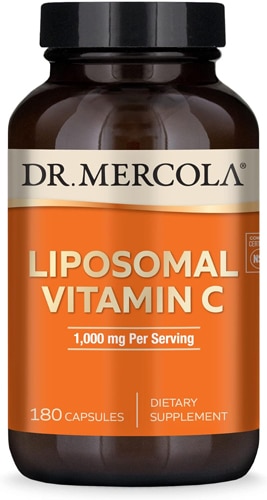Edited by Liz Lotts
Vitamin C is a scientifically proven, well-established and well-known antioxidant. You probably know that vitamin C is found in all kinds of fruits and vegetables, such as oranges and bell peppers. Of course, vitamin C is also found in supplement form, which can be a great alternative when your diet is lacking fresh, colorful produce.
Vitamin C supplements come in a variety of options, including tablets, powders, liquids and soft chews. One of the most talked-about forms, however, is
liposomal vitamin C. If you haven’t heard about it yet, keep reading.
The science behind liposomal vitamin C is interesting enough, but the health benefits are even more appealing.

What is Liposomal Vitamin C?
To understand liposomal vitamin C, it helps to answer the question: what is a liposome? Liposomes are tiny, nano-sized bubbles made of cholesterol and phospholipids – the same fat-like substances that make up a cell membrane. The term ‘
liposome’ has been around since the mid-1960s, but the technology has come a long way since. Today, liposomes can vary by size, lipid composition and surface charge. This allows liposomes to be used in a number of different ways, particularly as a delivery vehicle for cosmetics and pharmaceuticals.
In liposomal vitamin C formulas, vitamin C is encapsulated in a liposome bubble. This bubble helps protect the integrity of vitamin C as it travels throughout your body. In other words, the liposome delivers vitamin C directly to your cells without losing nutrient quality or consuming additional energy.
The Safety and Efficacy of Liposomal Vitamin C
Are there any safety concerns or side effects with liposomal vitamin C?
There has been some skepticism surrounding liposomal vitamin C. Some have wondered, “Is liposomal vitamin C a hoax?” Rest assured, liposomal (also known as pro-liposomal) vitamin C is not just a fancy marketing term. As previously mentioned, liposome technology has been around for decades and has been used in a number of cosmetic products, supplements and drugs. Liposomes have even been used
to increase vaccine effectiveness. The safety of liposomes has been proven again and again.
Does liposomal vitamin C work?
As for its effectiveness, scientific research confirms liposomal vitamin C is top-notch.
A study from 2016 compared intravenous vitamin C and encapsulated, liposomal vitamin C. The results? Plasma vitamin C concentrations were greater with the encapsulated vitamin C at two, three and four hours after administration. A more recent study published in
Journal of Liposome Research demonstrated similar results. The liposomal formulation of vitamin C used in this medical experiment offered “enhanced bioavailability of vitamin C.”
Remember that vitamin C is a water-soluble vitamin, meaning it cannot penetrate fatty tissue on its own. By containing vitamin C in a fatty membrane, vitamin C is protected from stomach acid and other harmful elements as it passes through your digestive tract. This offers a much more bioavailable form of vitamin C than traditional supplements.
Should You Take Liposomal Vitamin C?
Vitamin C is an essential nutrient for a reason. Your body uses it to repair tissues, to form collagen and to protect cells against free radical damage. Fortunately, most people in the U.S. get enough
vitamin C from foods and beverages. But if you do need to supplement your diet,
liposomal vitamin C might be your best bet. Below are a few situations in which liposomal vitamin C is the superior choice for a healthy body inside and out.
If you want glowing skin
Age, sun exposure and certain health conditions make it tough to maintain a youthful glow. But all experts would agree that antioxidant protection can help mitigate some of these effects. Since vitamin C is an antioxidant, it’s a very beneficial addition to your skincare and supplement routines. A study on the first edible liposomal vitamin C gel, Altrient® C, demonstrated
significant improvement in skin elasticity in just four weeks. Study participants who used Altrient® C improved skin firmness and elasticity by 32.7%.
If you want a healthy heart
Epidemiological studies have suggested that antioxidant-rich foods help reduce oxidative changes to low-density lipoproteins, which is a major risk factor of cardiovascular disease. The National Institutes of Health goes on to say that, “in addition to its antioxidant properties, vitamin C has been shown to reduce monocyte adherence to the endothelium,” as well as improve nitric oxide production for vasodilation (opening of blood vessels to decrease blood pressure).
In fact,
one study from 2020 compared the effects of liposomal vitamin C vs. non-liposomal vitamin C on blood pressure in rats. After four weeks, the researchers found that the liposomal form of ascorbic acid (vitamin C) was associated with pronounced effects on systolic blood pressure. Liposomal ascorbic acid helped lower systolic blood pressure with a significantly lower concentration of vitamin C than the non-liposomal counterpart. In other words, a lower dose of vitamin C had greater influence, because the liposomes were more effective at delivering the nutrient.
If you’re tired of injections
Intravenous vitamin therapy has become a trendy form of self-care. Med spas and “IV lounges” have popped up across the country, promising 100% absorption of vitamins. Vitamin C is a common addition to these IV therapy formulas. It’s true that IV administration is more effective than oral vitamin C tablets, because it bypasses the digestive tract. But studies have shown liposomal vitamin C (taken orally) is
even more effective than the IV method. Not to mention, IV
infusions of vitamin C come with a risk of infection, pain at the injection site and phlebitis (inflammation of veins).
If you’re nutrient deficient
Vitamin C bioavailability depends on intestinal absorption and is influenced by renal reabsorption and secretion. Certain lifestyle and disease factors can also alter bioavailability, leading to
vitamin deficiency symptoms. People at an increased risk of vitamin C deficiency include those who smoke, those exposed to secondhand smoke, people who eat a limited diet and those with certain medical conditions, including kidney disease and some types of cancer. These at-risk individuals benefit most from liposomal vitamin C, because it improves intestinal absorption.
Once the encapsulated, liposomal vitamin C has safely traveled through the digestive process, it quickly gets absorbed by the cells lining your small intestine. From there, the nutrient runs through the lymphatic system, and then to your bloodstream. Finally, blood carries the high-quality vitamin C to various areas of the body. This process optimizes absorption and ensures vitamin C reaches the cells that need it most. Thanks to improved bioavailability, your body can use more of this essential nutrient for maintaining peak health.
†These statements have not been approved by the Food and Drug Administration. These products are not intended to diagnose, treat, cure or prevent disease.





